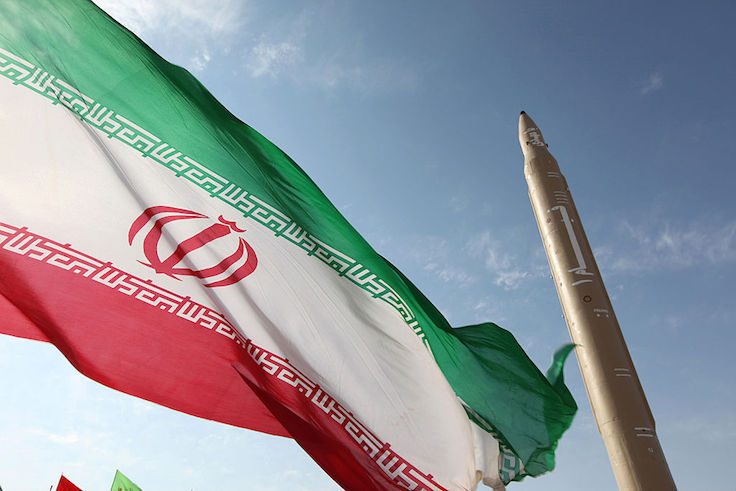Tehran announces installation of new advanced centrifuges used to quickly enrich uranium for an atomic bomb

Iran publicly accelerated its contested nuclear work on Friday, installing advanced centrifuges to more quickly enrich the uranium needed to fuel an atomic bomb.
Tehran announced its latest escalation after the International Atomic Energy Agency (IAEA), the world’s nuclear watchdog, censured the country for failing to cooperate with an ongoing investigation into Iran’s atomic weapons work.
Iran’s atomic energy organization said in a statement that the hardline regime is now launching “a significant collection of new and advanced centrifuges of various types.” This equipment is used to purify uranium to the levels needed for a nuclear weapon and will help Iran achieve this benchmark even quicker than it already can. Iran is also removing cameras from several nuclear sites, making it more difficult for inspectors to monitor the country’s work.
“These measures are being taken in order to protect the country’s interests and further develop the peaceful nuclear industry,” the country said, claiming that none of its ongoing work is related to weapons development.
Global powers, including the United States, disagree. Iran’s ongoing enrichment activity has already given it enough fissile material to power four nuclear warheads. With more advanced centrifuges online, Tehran will be capable of producing around 10 nuclear weapons in a month and 16 in a five-month period, according to analysts.
The IAEA further determined in two reports earlier this week that Iran has amassed a stockpile of 60-percent enriched uranium, just a “stone’s throw” away from weapons grade material. The country’s stock of low enriched uranium—which can be fueled higher—also grew as the country installed at least six additional clusters of advanced centrifuges.
It is this activity that pushed the IAEA on Thursday to formally censure Iran for obfuscating its nuclear activity and preventing international inspectors from accessing several contested sites believed to be part of the country’s covert atomic weapons program. The IAEA’s board of governors voted 19 to 3 in favor of the censure, with Russia, China, and Burkina Faso running defense for Tehran.
The increasingly tense standoff between Iran and Western powers is only likely to accelerate over the coming months as the outgoing Biden-Harris administration works to avoid upsetting Tehran in its final days. The Islamic Republic has also promised to launch another direct attack on Israel as payback for the Jewish state’s unprecedented October bombing of multiple military installations.
Iran’s foreign ministry drew a direct line between the IAEA censure and its standoff with Israel, alleging the international body is relying on “fake information from the Zionist regime.”
“The approval of the foregoing resolution happened based on a hasty and unbalanced report by the IAEA director general and also on fake information from the Zionist regime,” the country said. “So the passing of the resolution will have no effect but the weakening of the trend of cooperation and interaction of the Islamic Republic of Iran with the IAEA.”
President-elect Donald Trump, experts say, will be forced to confront Iran and its growing nuclear program almost immediately after taking office. For four years, the Biden-Harris administration flooded Iran’s hardline regime with cash, providing upwards of $100 billion in sanctions relief that has helped fuel Tehran’s multi-pronged war against Israel.
“Iran’s usual approach of nuclear extortion is going to backfire,” said Andrea Stricker, a nonproliferation expert at the Foundation for Defense of Democracies think tank. “These new advances will only solidify the resolve of the incoming Trump administration, as well as the Europeans, to hold Tehran accountable after Biden’s policies allowed the regime to advance to the nuclear threshold.”
In the wake of Israel’s October strike on Iran, which wiped out large swaths of the country’s air defense, further “military strikes on Iran’s nuclear sites are now on the table for Israel, including potentially with U.S. assistance,” Stricker said.
Amid this possibility, Iran is already pressuring the incoming Trump administration to resume diplomatic negotiations aimed at securing a revamped version of the 2015 nuclear deal.
Ali Larijani, a senior adviser to Iran’s supreme leader, said on Friday that Trump should either return to the original accord or ink a new one under “conditions” set by Tehran.
“They should either return to the [nuclear deal] and also compensate our losses in a way” or the incoming president “should accept our conditions and sign a new agreement,” Larijani told the country’s state-controlled press.
Original News Source – Washington Free Beacon
Running For Office? Conservative Campaign Management – Election Day Strategies!
